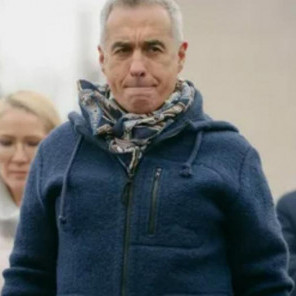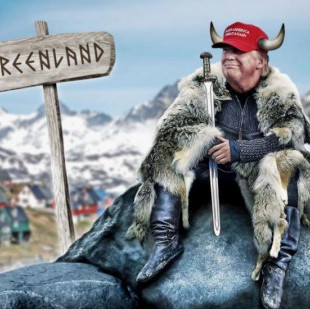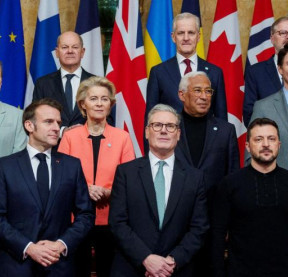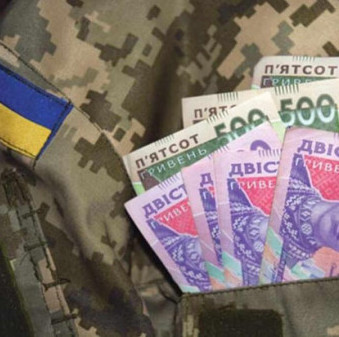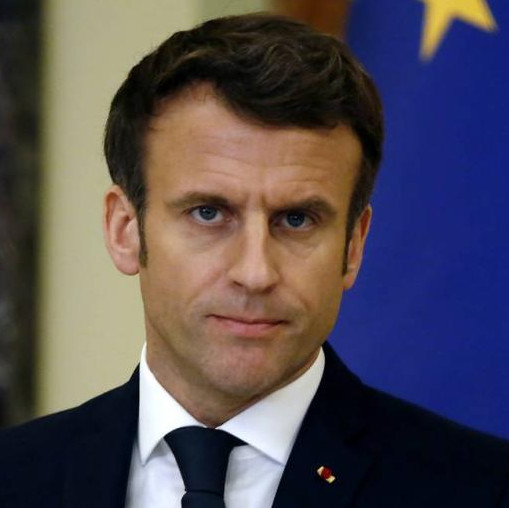
- Press review: US suspends USAID aid to Central Asia while Hamas visits Moscow again
- Press review: US urges elections in Ukraine as Trump enforces tough import tariffs
- Press review: NATO increases defense spending as Russia-Germany trade turnover falls
- Press review: Kiev may lose military aid while Trump
Budapest abandons its veto on anti-Russian sanctions in return for energy security; Donald Trump’s immigration policies threaten to strain US relations with Latin America. Meanwhile, Iran confirms the purchase of Su-35 fighter jets from Russia. These stories topped Tuesday's newspaper headlines in Russia, according to TASS News Agency.
Vedomosti: Hungary backs anti-Russian sanctions renewal for energy security
Hungary secured energy guarantees from the EU regarding gas and oil supplies, Hungarian Foreign Minister Peter Szijjarto announced on January 27. Following this, Budapest dropped its veto threat and agreed to a six-month extension of EU sanctions on Russia.
Hungary’s familiar bargaining tactic with the EU, aimed at leveraging its position, reflects a calculated strategy, noted Sergey Shein of the Higher School of Economics. While threatening to challenge EU sanctions, Hungary ultimately avoids direct confrontation, as this would be too costly for Prime Minister Viktor Orban.
Alexey Belogoryev of the Institute for Energy and Finance Foundation observed that Hungary hopes the EU-Russia standoff will ease over time, benefiting MOL, Hungary’s energy giant, by avoiding the need to replace Russian supplies.
Meanwhile, the European Commission announced ongoing gas talks with Kiev, involving Hungary and Slovakia. Igor Yushkov, an expert at the Financial University under the Government of the Russian Federation, suggested that these talks represent the guarantees promised by Brussels. However, despite limited assurances, Budapest and Bratislava have bolstered their positions for potential future disputes with Kiev.
Izvestia: US migrant policies risk straining ties with Latin America
US President Donald Trump’s controversial deportation policies have sparked significant tensions with Latin American nations. The United States and Colombia, for example, exchanged threats over trade tariffs and visa restrictions, while Brazil criticized the US for its mistreatment of deported migrants.
Although Brazil, Mexico, and Colombia were initially expected to respond strongly to Trump’s deportations due to their left-wing, anti-American governments, Colombia emerged as the sole country to do so. No comparable reactions from other nations are likely, Andrei Pyatakov, a senior research fellow at the Russian Academy of Sciences’ Institute of Latin American Studies, suggests. Most Latin American countries, he predicts, will adopt a muted stance on the issue.
Any escalation in US-Latin America relations would harm the United States, given the region's deep economic connections with Washington. Furthermore, an overly aggressive approach to migration could drive Latin America toward China, a shift Trump has sought to prevent since his first term.
"China has established a strong presence in Latin America. If US policies alienate its partners, they could gravitate toward China," Pyatakov explained to Izvestia. "China is investing heavily in infrastructure projects across the region. For instance, last year, it initiated talks to construct a Nicaraguan Canal as an alternative to the Panama Canal. China also operates several ports in Latin America, including in Peru and Cuba."
Additionally, Russia could capitalize on this situation as a BRICS member, foreign analysts note. Brazil, which holds the grouping’s rotating presidency this year, could encourage regional players to engage with BRICS, with Colombia emerging as a potential partner. Colombian Foreign Minister Luis Gilberto Murillo told Izvestia in November that his country is exploring the possibility of joining BRICS.
Kommersant: Iran confirms buying Su-35s from Russia
On Monday, the Iranian military officially announced the acquisition of a batch of Su-35 fighters from Russia. While the exact cost or the number of aircraft was not disclosed, estimates suggest the contract's value ranges between $4.5 billion and $5 billion. However, the future of Moscow’s additional agreements with Tehran remains uncertain due to potential shifts in Iran's foreign policy toward closer cooperation with the United States.
The purchase was revealed by Deputy Chief of the Khatam al-Anbiya Central Headquarters of the Iranian Armed Forces, Islamic Revolutionary Guard Corps (IRGC) General Ali Shadmani on Monday, as reported by Entekhab. According to earlier updates, Tehran received its first batch of Su-35s in November.
Shadmani did not specify how many fighter jets were acquired from Russia, nor have Russian officials disclosed the contract’s total value. Previously, Germany’s aerospace magazine Flug Revue reported that Moscow and Tehran initially agreed on 25 jets, but later doubled the figure.
This purchase coincides with progress surrounding Iran’s nuclear program and renewed efforts to implement the Joint Comprehensive Plan of Action (JCPOA), an agreement between Iran, Russia, China, the United States, France, Great Britain, and Germany. Iranian officials at the United Nations stated in March 2023 that Tehran had finalized a deal to procure Su-35s from Russia.
Vladimir Sazhin, a researcher at the Russian Academy of Sciences’ Institute of Oriental Studies, noted that the future of military-technical cooperation between Russia and Iran will depend largely on resolving Iran's nuclear issue and agreements with Washington. "The majority of Iran’s political elite and business leaders favor engagement with the West, and the country is grappling with a severe economic crisis. The key to resolving this crisis lies in addressing the nuclear issue, which hinges on the involvement of the United States and the leadership of new US President Donald Trump," the expert stated.
While ending Tehran’s collaboration with Moscow could be pivotal in securing a new nuclear deal between the US and Iran, the Islamic Republic is likely to honor all previously established agreements under the late president Ebrahim Raisi, including contracts that "may even be new to us," Sazhin added.
Izvestia: Could Russia, US deepen space cooperation under Trump?
Roscosmos and the US National Aeronautics and Space Administration (NASA) continue to collaborate as part of the International Space Station (ISS) program, even after the arrival of the current US administration, the Russian state-run space corporation told Izvestia. The ISS program remains on track in accordance with previously established agreements and international documents. Russia upholds its commitments and maintains routine working communication with NASA, Roscosmos reported.
Expanding the space program has become a key focus for the new US administration. Trump has pledged to send American astronauts to Mars, as announced in his inaugural speech. Additionally, he selected Jared Isaacman, a billionaire entrepreneur and two-time space traveler, to serve as the next NASA administrator.
Elon Musk, who now heads the newly created Department of Government Efficiency and has effectively taken on an informal advisory role in the Trump administration, is expected to play a pivotal role in shaping Washington’s outer space policies. Prior to Russia’s special military operation, Musk had even proposed strengthening bilateral space collaboration.
At present, cooperation between Russia and the US in outer space is largely confined to joint efforts under the ISS project, Roscosmos CEO Yury Borisov noted in May 2024. "The ISS program is expected to end by 2028 or 2030, as the station’s service life has reached its limit—it was originally set to conclude in 2015," Ivan Moiseyev, scientific director of the Space Policy Institute, told Izvestia.
Looking ahead, Moscow and Washington could potentially collaborate on the Artemis project, which aims to restore human presence on the Moon, said Igor Marinin, an Academician with the Russian Academy of Cosmonautics named after Tsiolkovsky. "However, Russia has its own program to develop a new orbital station and is actively cooperating with China on lunar exploration. We are not inclined to participate in the US program," he explained.
Conversely, Washington is likely to advance its military space programs, which were initiated during Trump’s first term, Moiseyev emphasized. Russia has consistently opposed the militarization of outer space.
The topic of space cooperation might also surface during a potential meeting between Russian President Vladimir Putin and US President Donald Trump. US media outlets have even suggested inviting Russia to participate in Moon and Mars missions as a means to facilitate dialogue on Ukraine.
Kommersant: Trump’s rhetoric drags non-ferrous metals down
Non-ferrous metals declined sharply last week as US President Donald Trump threatened to impose a 10% tariff on Chinese imports starting February 1 and a 25% duty on goods from Mexico and Canada.
Among other metals, nickel prices dropped following statements from Indonesia, a supplier responsible for nearly 50% of global production, announcing plans to cut its nickel ore production quota. However, the Southeast Asian nation reversed its stance on January 27. At current nickel prices, up to 40% of global producers could face unprofitability, Akhmed Aliyev, an analyst at BCS World of Investments, warned. Dmitry Orekhov, managing director at the National Credit Ratings agency, added that declining demand from EV manufacturers has also contributed to falling nickel prices.
Copper prices below $10,000 per metric ton would render all new projects unprofitable, Boris Krasnozhenov, head of securities market analysis at Alfa Bank, told Kommersant. The situation is especially concerning for Russian copper suppliers. "As China depends on copper imports, the bulk of Russian exports is targeted at the Asia-Pacific region. How the situation evolves will largely depend on US-China relations," a major non-ferrous metals company told Kommersant.
Nevertheless, the price drop in major non-ferrous industrial metals is unlikely to be critical or long-lasting, experts argue. Orekhov believes that interest rate cuts in the US and the EU, along with measures to stimulate the Chinese economy and accelerated industrialization in India, will help stabilize prices. Krasnozhenov also anticipates industrial metal prices will rise in 2025. China, which consumes over 50% of these metals, has been recording more than 5% annual growth in industrial production. Moreover, hydrocarbon neutrality initiatives could boost copper consumption by over 50% by 2040.
TASS is not responsible for the material quoted in these press reviews
